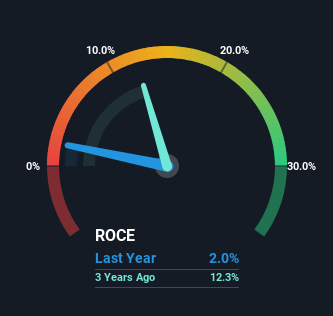- United States
- /
- Healthcare Services
- /
- NasdaqGS:PRVA
Privia Health Group's (NASDAQ:PRVA) Returns On Capital Not Reflecting Well On The Business
If we want to find a stock that could multiply over the long term, what are the underlying trends we should look for? In a perfect world, we'd like to see a company investing more capital into its business and ideally the returns earned from that capital are also increasing. Put simply, these types of businesses are compounding machines, meaning they are continually reinvesting their earnings at ever-higher rates of return. Having said that, from a first glance at Privia Health Group (NASDAQ:PRVA) we aren't jumping out of our chairs at how returns are trending, but let's have a deeper look.
Understanding Return On Capital Employed (ROCE)
For those that aren't sure what ROCE is, it measures the amount of pre-tax profits a company can generate from the capital employed in its business. The formula for this calculation on Privia Health Group is:
Return on Capital Employed = Earnings Before Interest and Tax (EBIT) ÷ (Total Assets - Current Liabilities)
0.02 = US$11m ÷ (US$938m - US$358m) (Based on the trailing twelve months to June 2023).
Thus, Privia Health Group has an ROCE of 2.0%. In absolute terms, that's a low return and it also under-performs the Healthcare industry average of 9.7%.
See our latest analysis for Privia Health Group

In the above chart we have measured Privia Health Group's prior ROCE against its prior performance, but the future is arguably more important. If you'd like to see what analysts are forecasting going forward, you should check out our free report for Privia Health Group.
So How Is Privia Health Group's ROCE Trending?
On the surface, the trend of ROCE at Privia Health Group doesn't inspire confidence. To be more specific, ROCE has fallen from 6.0% over the last four years. Although, given both revenue and the amount of assets employed in the business have increased, it could suggest the company is investing in growth, and the extra capital has led to a short-term reduction in ROCE. And if the increased capital generates additional returns, the business, and thus shareholders, will benefit in the long run.
The Bottom Line
Even though returns on capital have fallen in the short term, we find it promising that revenue and capital employed have both increased for Privia Health Group. These growth trends haven't led to growth returns though, since the stock has fallen 29% over the last year. As a result, we'd recommend researching this stock further to uncover what other fundamentals of the business can show us.
If you'd like to know about the risks facing Privia Health Group, we've discovered 2 warning signs that you should be aware of.
If you want to search for solid companies with great earnings, check out this free list of companies with good balance sheets and impressive returns on equity.
New: Manage All Your Stock Portfolios in One Place
We've created the ultimate portfolio companion for stock investors, and it's free.
• Connect an unlimited number of Portfolios and see your total in one currency
• Be alerted to new Warning Signs or Risks via email or mobile
• Track the Fair Value of your stocks
Have feedback on this article? Concerned about the content? Get in touch with us directly. Alternatively, email editorial-team (at) simplywallst.com.
This article by Simply Wall St is general in nature. We provide commentary based on historical data and analyst forecasts only using an unbiased methodology and our articles are not intended to be financial advice. It does not constitute a recommendation to buy or sell any stock, and does not take account of your objectives, or your financial situation. We aim to bring you long-term focused analysis driven by fundamental data. Note that our analysis may not factor in the latest price-sensitive company announcements or qualitative material. Simply Wall St has no position in any stocks mentioned.
About NasdaqGS:PRVA
Privia Health Group
Operates as a national physician-enablement company in the United States.
Flawless balance sheet and good value.
Similar Companies
Market Insights
Community Narratives



